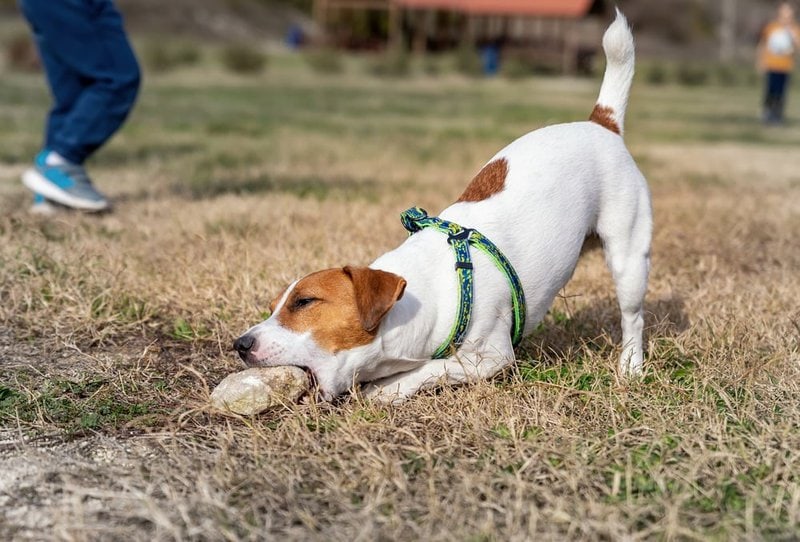Dogs are not fussy feeders, so there is a serious problem when their appetite expands and starts including non-food items such as rocks, paper, and wood. Ingesting these inorganic objects like rocks is not a good idea, and it can be dangerous. Since your dog can’t digest them, it means the rocks will remain in the digestive tract for an extended period. But why would a dog eat rocks?
Dogs eat rocks for various reasons, and these reasons can be behavioral, medical, nutritional, and psychological. Some of the reasons dogs eat rocks are serious, and they may need immediate medical attention, while others you can work on. To stop your dog from eating rocks, you will need to know why your dog is eating rocks.
This article will help you understand the various reasons why dogs eat rocks and how best you can stop this behavior. So, keep reading to find out.
Why Do Dogs Eat Rocks?
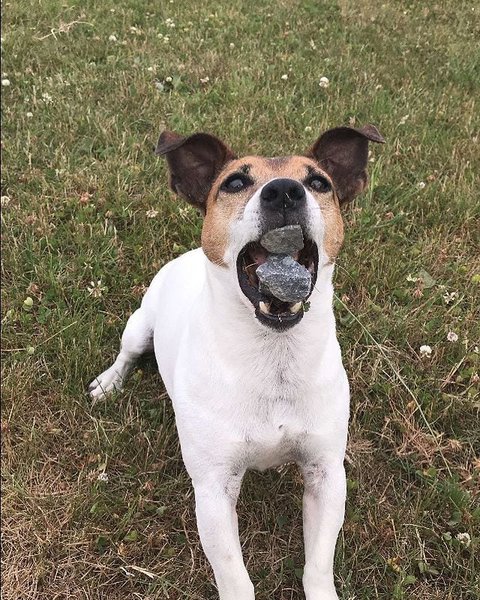
Dogs eat rocks for different reasons, and sometimes your pooch eating rocks should not be alarming as it may be a minor issue. Other times, you might observe your dog will chew rocks and stones but will not swallow.
Licking, chewing, and even accidentally swallowing doesn’t necessarily mean that your dog has a serious problem, but it can quickly escalate into an emergency.
When your dog is constantly trying to eat rocks, these non-food items can easily cause damage to your dog’s body. Below are some of the major reasons your dog might be eating rocks:
Behavioral Issues
Behavioral issues can occur for a lot of reasons, and these can range from pain to boredom, and we have listed the common ones below:
Boredom
As a dog owner, you know that bored dogs get destructive, and keeping your dog entertained is a part of dog ownership. Primarily, young dogs and puppies are the ones who eat rocks out of boredom, but any dog may start doing it too.
These puppies will chew furniture or ingest odd things in your yards, such as plants or dirt if they have not been physically and mentally enriched to find ways of dealing with boredom.
Attention Seeking
Dogs are brilliant, and sometimes it can become manipulative when the dog wants you to spend all your time with it, or you are genuinely neglecting time with your dog.
For example, your dog may eat inappropriate things, such as rocks and other non-food items to seek attention.
If your dog knows it will immediately get attention when it eats rocks, then it will eat some rocks to get that attention, and they will continue to repeat the action until there is a solution.
Teething
Puppies are also prone to putting things in their mouth during the teething stage, where sometimes they may do this as a way of exploring the world around it.
However, your puppy eating rocks may indicate it is quite uncomfortable during the teething process. If your puppy seems uncomfortable, then you need to talk to your vet.
Otherwise, the teething stage is a normal part of a puppy’s growth, and it isn’t much you can do about it.
Medical Conditions
Common medical conditions happening to dogs will include:
Malnutrition
Some people don’t know that a dog doesn’t have to be underweight to be malnourished, where malnourishment is a sign that one of your dog’s nutritional needs is not being met.
Even with an overweight dog, this can mean it can still be malnourished. In addition, the quality and type of food you give your dog should be evaluated, and you need to ensure it still does meet your dog’s needs.
Malnutrition in dogs is because of starvation for abandoned and stray dogs or your dog not getting a nutritionally deficient diet. This occurs primarily when dog owners feed their dog a raw diet or cook for their dog without understanding the kind of nutrition their dog needs. If you want to change your dog’s diet, you should consult a veterinary nutritionist.
Vitamin Deficiencies
Several things may cause vitamin deficiencies in dogs, and more often, these vitamin deficiencies go hand in hand with malnutrition. However, some dogs may experience vitamin deficiencies related to a disease or an illness.
For example, diarrhea can result in nutrient deficiencies where it doesn’t allow the dog’s body to absorb all the required vitamins as its food is digested. Also, some cancer types can block your dog from absorbing vitamin absorption.
Parasites
Some parasites can make your dog want to eat strange non-food items, such as rocks. This is often because the parasites block your dog’s gastrointestinal tract.
Notably, dogs with parasites and those that eat rocks will often experience vitamin deficiencies and malnutrition, and this tells you that all these causes connect in one way or another.
Anemia
Anemia is brought about by many things, but the most likely cause is iron deficiency, which causes your dog to eat rocks and other non-food items.
Also, iron-deficiency anemia can be brought by some type of blood loss, whether after major surgery, acute or chronic, such as a slowly bleeding tumor. Iron is a vital mineral to anybody as it allows the body to transport oxygen in the red blood cells.
Therefore, if your dog lacks iron, it may start to crave mineral-based things such as dirt and iron in an attempt to feed the deficiency.

Diabetes
Diabetes is a serious but treatable medical condition that causes your dog to eat rocks. This is because of the nutrient deficiencies or excess hunger that are associated with this condition.
Other common symptoms associated with diabetes in dogs include excessive urination and excessive water consumption. If you suspect your dog has diabetes, you should visit a vet immediately.
Psychological Conditions
The following are examples of psychological conditions commonly found in dogs:
Pica
Pica is a medical condition that involves people and animals eating non-food items. Even though it is a medical condition, it has a psychological part.
Pica can cause dogs to vomit, experience diarrhea, and get intestinal blockage caused by the non-food items they eat.
Anxiety And Stress
Stress and anxiety in your dog can be caused by fear, change, and hostile interactions, and if your dog experiences any form of anxiety and stress, it may start to eat rocks to self soothe.
Therefore, you should determine the cause of making your dog anxious and focus on treating the cause.
Confusion
If your dog is confused, be it from old age, medications, or a medical condition, you might see it eating rocks. It is because your dog’s confusion level has reached the point where its brain tells it that eating rocks is the most appropriate thing to do.
Is It Dangerous For Dogs To Eat Rocks?
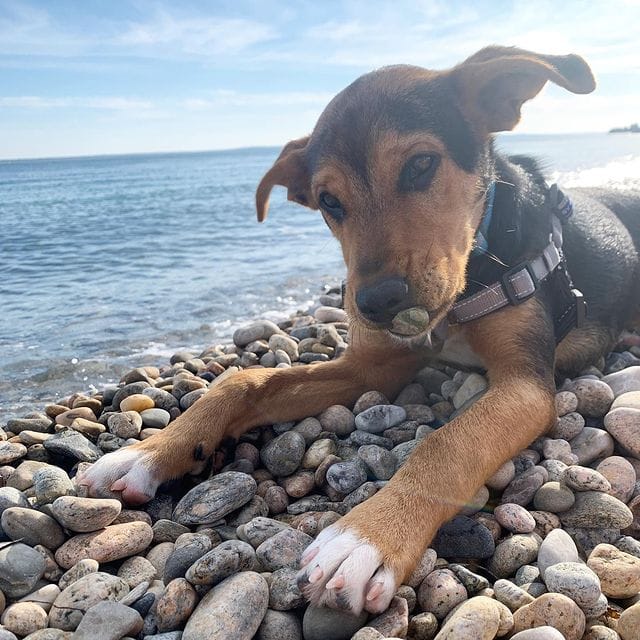
The answer is yes and no. It is not ideal for dogs to ingest rocks, but it’s not always dangerous as some factors determine this including, the age and size of your dog, composition of the rock, and the shape and size of the rock.
Therefore, if the dog is older and the shape and size of the rock are not that big, it won’t pose an immediate danger to your dog.
However, there are no benefits of allowing your dog to eat rocks, and there are some risks that may be associated with your dog eating rocks.
What Are The Risks Associated With Dogs Eating Rocks?
Chewing rocks can pose many risks and health problems, and there have been a few cases of dogs needing surgery after consuming rocks. Some risks associated with dogs eating rocks include:
Intestinal Blockages
If your dog ingests a large rock, it may cause a blockage that may need surgery to remove. Rocks may quickly get stuck in their throat and cause a breathing problem, which can sometimes be fatal.
In addition, intestinal blockages usually prevent pooches from getting adequate nutrition, and they may result in your dog vomiting or becoming lethargic.
If you suspect your dog has ingested and swallowed something, you should immediately visit a vet to get confirmation and have it removed.
Perforated Stomach Or Colon
Rocks, especially the sharp ones, can result in perforation as they pass through your dog’s digestive tract. If your dog shows any signs of perforation, you will need to take them to the vet immediately for treatment.
Upset Stomach
Your dogs’ stomach may be irritated with even the smallest of pebbles for the simple reason that they are non-food items. As a result, they experience diarrhea and even vomit even after eating a few pebbles.
Chipped Or Broken Teeth
If your dog continuously chews on rocks and hard stones, they may damage and chip their teeth, and this will result in needing dental work done or even having the damaged tooth removed. Notably, dog dental work is usually done under anesthesia, bringing additional risks.
What Should You Do If Your Dog Eats Rocks?
Once you notice that your dog is eating rocks at home, you need to make an appointment with your vet immediately. Your veterinarian will do a physical examination to check if your dog has a nutritional deficiency or an underlying health condition.
If your dog’s habit of eating rocks stems from a health condition, your vet will recommend advice, medication, or special diets to help with the issue.
If there are no medical causes, you should focus on solving the behavioral issues as a dog owner. You can use the above tips, and there is always the option to consult a dog trainer for obedience classes.
Ensure you always offer plenty of positive reinforcement opportunities, especially in outdoor situations where your dog tends to chew on the rocks.
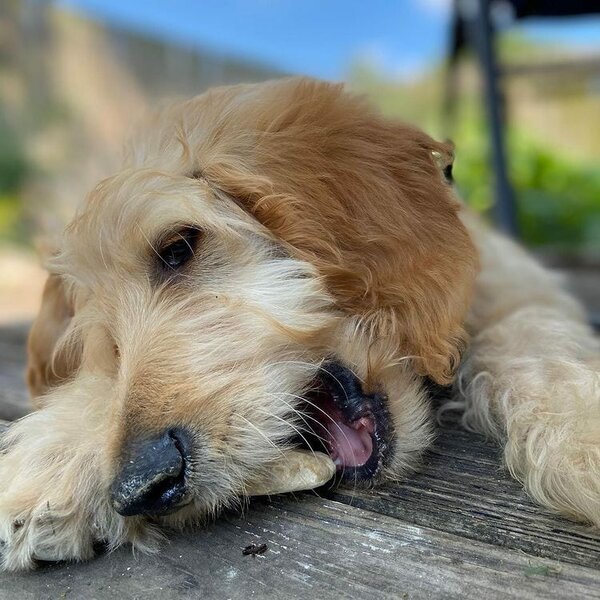
Can I Stop My Dog From Eating Rocks?
Yes, there are several ways you can use to stop your dog from eating rocks, and removing the number of rocks around your dog will not be enough.
Depending on why your dog is eating rocks, you can find a solution to it, and it is pretty easy, including:
Behavioral
If your dog is eating rocks from boredom, attention or they think it’s a game, there are some things you can do to stop your beloved pooch from eating rocks, including:
Exercising Regularly
Your dog could be suffering from a lack of exercise, where most behavioral issues can be solved through increasing activities.
For example, you can take your dog for longer walks or get a dog walker, find new dog friends or drop your dog in a dog daycare once a week. Anything you can take up to stimulate your dog and eliminate the boredom is beneficial.
Training Properly
Dogs are constantly picking rocks, sticks, mud, and stones from the ground, which can make your dog walks a nightmare. You can train your dog to understand the ‘Leave it’ and ‘Drop it’ commands. These commands can be helpful if your dog picks up something that could be harmful to it.
Alternatively, you can get a dog trainer to train your dog if you are struggling or don’t have enough time. Then, increase the difficulty of these commands by practicing them in different environments and with different toys and items
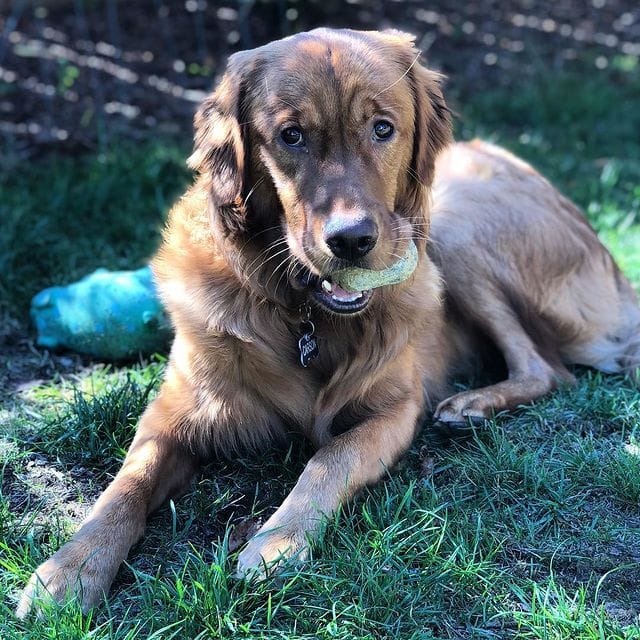
Spending More Time Together
If your dog picks and eats rocks to get your attention, they will probably continue doing it. If you suspect this is why the dog is eating rocks, you should spend more time with it.
You can enroll in a training class, play fetch more frequently, spend more time walking, and even enjoy a good snuggle with your dog. Any additional time spent could eliminate the attention-seeking behavior of eating rocks.
Understanding Age As A Factor
Age is relevant when the dog eating rocks is a puppy, and sometimes it does this because of teething, just like with a human baby and curiosity. Before you trust your puppy, it’s okay to limit its access to your yard and keep it on a leash under supervision at all times.
If your puppy is chewing rocks, but it’s not swallowing them, it may be a sign that they need something to chew on, and you could get some chew toys. However, to avoid boredom, you can limit its access to the chew toys, making chewing exciting again for it.
Assessing Medical Conditions
If a dog owner suspects there could be any medical conditions that are causing their dog to eat rocks, they should immediately visit a vet.
Most food items pass within 24 hours, but some non-food items such as rocks can take longer to pass through, and indigestible objects can cause a blockage. This can be deadly, and you can either help the rocks or consult a vet.
Improving Diet
If you suspect your pooch is nutrient deficient, then you should check its food, as low-quality dog food can be filled with ingredients that don’t add value to your pooch. You can try to switch up their food but ensure you do this slowly to prevent an upset stomach.
However, if switching to a high-quality diet does not help, reach out to your vet. They will advise the right food for your breed depending on their activity level and age. Alternatively, if your dog is deficient in a specific vitamin, your vet can recommend vitamins or supplements that your dog can ingest.
Psychological Conditions
In terms of psychology, there are some things you can do to stop your beloved pooch from eating rocks, including:
Relieving Both Anxiety And Stress
The first step in solving anxiety is identifying the cause of stress and anxiety, and it will help you prevent it. For example, to prevent the anxiety that makes dogs eat rocks, you can add some running, walking, and even swimming exercises.
In addition, you can incorporate some treat toys to offer some stress relief as they will need licking, which can reduce their stress levels while providing mental stimulation to tire your dog out.
Lastly, coming up with an organized routine can help in relieving the stress and anxiety they may have and, as a result, prevent them from eating rocks. A routine will help your pooch know when it’s time for feeding, exercising, or using the potty.
However, you should ensure that the routine will help your dog sleep better and be more settled during the day. Also, it’s essential to have some flexibility as it will help your dog adjust in case of any significant changes without causing more stress and anxiety.

